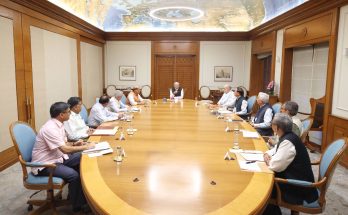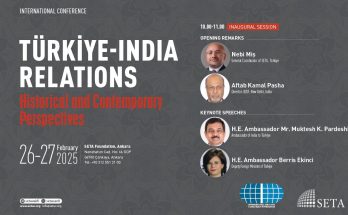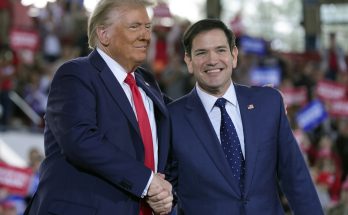India’s multifaceted ties with Vietnam are poised to acquire greater strategic and economic weight. The visit of India’s External Affairs Minister to Vietnam August 25-26 is set to impart a fresh momentum to this burgeoning partnership, bound by a confluence of strategic, economic and energy interests. Sushma Swaraj’s trip will set the stage for the state visit by in September.
 In this exclusive interview with Manish Chand, Editor-in-Chief, India Writes Network (www.indiawrites.org), Vietnam’s ambassador to India Nguyen Thanh Tan speaks about Vietnam’s expectations from the forthcoming visit by India’s foreign minister, the growing knowledge partnership between India and Vietnam and predicts an all-round acceleration in bilateral ties in days to come.
In this exclusive interview with Manish Chand, Editor-in-Chief, India Writes Network (www.indiawrites.org), Vietnam’s ambassador to India Nguyen Thanh Tan speaks about Vietnam’s expectations from the forthcoming visit by India’s foreign minister, the growing knowledge partnership between India and Vietnam and predicts an all-round acceleration in bilateral ties in days to come.
(Excerpts from the interview)
Q) Excellency, India’s External Affairs Minister, Sushma Swaraj will be travelling to Vietnam August 25-26. It will be the first bilateral visit from India to Vietnam after a new government was formed in New Delhi over two months ago. What are Vietnam’s expectation from this important meeting?
A) We look forward to welcoming her in Vietnam. The visit is very important because it is the first to Vietnam by External Affairs Minister Sushma Swaraj to Vietnam after the new government was formed in Delhi. This is a confirmation of India’s policy towards Vietnam — a very loyal friend since the two countries gained independence.
Q) This visit will be followed by the visit of India’s President Pranab Mukherjee to Vietnam. These are two high-profile visits in quick succession. What is the message here? Do you see the India-Vietnam relations moving onto a higher trajectory?
A) Both India and Vietnam enjoy strategic partnership. President Pranab Mukherjee will be visiting Vietnam soon after Prime Minister Modi took office. It is a confirmation by the Indian government towards India’s Vietnam policy. And our leaders are looking forward to the president’s visit. We hope that both countries discuss issues relating to bilateral relations. Both the countries will also exchange views on regional situations as well international issues. Both visits take place within a short period of time. The first visit by the external affairs minister will be preparatory to the visit of India’s president to our country.
Q) India-Vietnam economic relations have been growing by the day. Bilateral trade is hove

ring around $6 billion. The two countries have set an ambitious plan to scale it up to 15 billion USD by 2020. Are we on course to achieve this target? In what areas is Vietnam looking for investment from India?
A) Trade and commerce cooperation between India and Vietnam have been in a good shape. The trade volume increased rapidly in 2010, when it was only 3.4 billion USD; last year it was $6.2 billion. It is feasible that both the countries may reach $7 billion at the end of 2015, and met the target set by our leaders. By the end of 2020, bilateral trade may reach $15 billion.
Q) How do you look at the evolving energy cooperation between the two countries?
A) During the visit to India by General Secretary of the Communist Part of Vietnam in 2013, both countries agreed that Vietnam will offer more oil gas blocs to India in the South China Sea. During the visit of India’s president to Vietnam, we hope that some MOU regarding cooperation in this field will be signed. This will of course improve cooperation with India to explore and exploit oil and gas. Last year, TATA got a project worth $ 1.8 billion to build a thermal power station in Soc Trang province. It is called Long Phu 2 thermal power project. It is a very big project. And TATA is working very hard to fulfil the contract and very soon we will start the project. In 2018, the project will be put into operation. Other companies, too, have a good chance to do business and invest in Vietnam. We encourage more Indian investments in our economy.
 Q) China has objected to India’s investment in Vietnam’s energy sector. What do you think of China’s reservations and threats?
Q) China has objected to India’s investment in Vietnam’s energy sector. What do you think of China’s reservations and threats?
A) In the past few years, China has been saying that the oil and gas blocks are in a disputed area; actually, that is totally wrong. Because most block numbers: 128, or 127 are inside the Exclusive Economic Zone of Vietnam. And other blocks we want to offer India are also inside our territory. So we don’t attach much importance to the claims by China. Vietnam will give India oil blocks inside its territory. Based on strategic cooperation and friendship, we will always find good blocks to offer to our Indian friends.
Q) Capacity building and development cooperation are important facets of India-Vietnam partnership. How do you look at cooperation in these areas?
A) India offers Vietnam 150 scholarships a year. India also offers around 10 scholarship under the Mekong-Ganga programme. India is a very good destination to send our officials to study, especially in the IT field. India also provides a good chance to learn administration for Vietnamese officials to improve their knowledge in the field of management. For the past few years we have used almost all these scholarship to send our students, or send our officials to study in India, and we continue to move in this direction. This year we have already made use of more than 100 scholarship offered to our officials. We find that studying in India is very good and effective. And we hope this continues. During 2012, our vice-premier, His Excellency Nguyen Thien Nhan, visited India and both sides decided to set up a working group on education and scientific technology cooperation between Vietnam and India. The group had two rounds of talks; it was very effective. Vietnam will make use of India’s experience in training officials and more officials from Vietnam will come to India to study.
Q) Defence cooperation between India and Vietnam have shown an upswing. In this context, India offered a line of credit worth $100 million to buy defence equipment. How do you look at the future of defence cooperation? And what are Vietnam’s expectations?
A) Defence cooperation between Vietnam and India were set up a long time back. First, we started posting the defence attaché in each country’s embassy, and then we signed the MOU on defence cooperation with the other country. The two countries have set up the Strategic Dialogue at the level of vice-minister of defence. For the past few years such cooperation has been strengthened and developed, and we find that India is very generous in its help to train Vietnamese officers of the navy, the air force and the infantry. We send a lot of officers to study in India, and the knowledge they get here is also good for Vietnam.
With regard to the credit line, the $100 million is good for Vietnam at this moment. We have used it to buy vessels from India, we know that Indian patrolling vessels are also very good. And given Vietnam’s long coastal line, we are keen to get more Indian vessels and Indian ships, apart from the imports from other countries in the region. Our capacity and strength has been bolstered.
 Q) How important is India to Vietnam’s aspirations to become a bigger economy, a bigger player in the region?
Q) How important is India to Vietnam’s aspirations to become a bigger economy, a bigger player in the region?
A) Vietnam is a member of ASEAN, and ASEAN has an FTA with India. And we are now going to sign an FTA in goods and services, which is very important. Having signed the FTA, it has eased sending good and commodities to Vietnam. When the FTA on services is signed it will also be easier to bring in other services to the country. Vietnam welcomes India’s good and commodities; one of the fields we are looking at now is textile industry. During the 80s we imported a lot of textile from India for large industries. Now Vietnam is also a good place to produce garments; we export to America and other places. We need materials. And India can be a good source in the coming years. I read an article and it says that India, by 2020, will export around 300 billion USD of textile; and Vietnam should be a good market for India also.
India is also a good market for goods from Vietnam, especially electronic item that you see in the market. In Vietnam there are a lot of joint ventures between Vietnam, Japan, South Korea, China, Taiwan, the products are good and they are available in the Indian market. We want to see that India has the chance of importing more and more products from Vietnam.
Another good news for us is that from November 5, Jet Airways will start the first direct flight between Delhi and Ho Chi Minh City. It will stop over at Bangkok for one hour only. Vietnam is also a good destination for Indian tourists. I read an article in an Indian newspaper that said that Indian tourist go to Thailand for a holiday, and when they come back they also purchase electronic items in Bangkok. I can say that the economic market is cheaper in Vietnam when compared to Thailand. Also the custom facilities in Vietnam are also easy. With a direct flight we can see that tourism cooperation between India and Vietnam will be expanding. As more commodities from India comes to Vietnam, and more commodities from Vietnam comes to India, our trade volume will be $ 10 billion very soon.
 Q) Vietnam and India have been culturally close as well. How do you see cultural contacts between the people of India and Vietnam moving forward?
Q) Vietnam and India have been culturally close as well. How do you see cultural contacts between the people of India and Vietnam moving forward?
A) Since you mentioned culture, I must say that Vietnam has many nice places for Indian tourists, like the Ha Long Bay, which is a world heritage site. People who travel to Ha Long Bay say that they want to visit Vietnam again. When you are in Ha Long Bay, you can hire a boat and enjoy one night out at the sea. You can have fresh food; catch fresh fish and cook it on the boat. The weather is very nice, and the view is beautiful. And I think it’s suitable for Indian tourists. I think Indian people should visit Vietnam because there is very long history of cultural cooperation between the two countries. There are a lot of Indian heritage sites in Vietnam; just 20 kilometres from Nha Thang city there are Indian temples. If you visit that area you can see more than ten temples, and people in that area follow cultures that is similar to what you have in in India.
In Ho Chi Minh City there are a lot of Indian restaurants, you can enjoy Indian food there. During the 80s and 90s, Vietnam’ people enjoyed Indian films, which were available on our TV and also shown in cinema halls. But I don’t know why for the past 10-20 years we see very few Indian films in Vietnam’s market; we need to find the reason why. Vietnamese people find Indian films very interesting. We can see Indian songs, music and also Indian tradition. It is also our duty to reintroduce Indian films in Vietnam in the next few years.
Q) Besides bilateral issues, India and Vietnam also engage closely on regional and global issues. How do you see the security cooperation between the two countries?
A) Vietnam has always emphasised India’s role in the region. We need Indian balance in the region. Cooperation between India and Vietnam in the area of defence has been on for a long time. Indian naval ships anchor in our ports yearly, and that’s very good. We also see Indian role in ARF. Your minister gave a good speech in Myanmar last week, and we also see that with the balance of India to the region the balance of force will be maintained. That is very important. The other thing is that India and Vietnam have the same position on issues in the region. When something happens in the region your position is clear. A week ago your minister of external affairs reconfirmed your position to the region, that you support peaceful solution to all the disputes in the area. You also support the safety of the sea lanes of communication, and the resolution of issues in accordance to international law, especially the 1982 Law of the Sea. India has rejected the use of force to solve problems in the region. I think that position is very important, it is the same position as that of Vietnam. India and Vietnam want peace, prosperity, stability and development to the region. In the coming days, we will continue to support India’s Look East policy. When the Look Easy Policy is carried out India makes an active contribution to peace, prosperity and development in the region. India has in Vietnam as loyal and all-weather friend.
Author Profile
- India Writes Network (www.indiawrites.org) is an emerging think tank and a media-publishing company focused on international affairs & the India Story. Centre for Global India Insights is the research arm of India Writes Network. To subscribe to India and the World, write to editor@indiawrites.org. A venture of TGII Media Private Limited, a leading media, publishing and consultancy company, IWN has carved a niche for balanced and exhaustive reporting and analysis of international affairs. Eminent personalities, politicians, diplomats, authors, strategy gurus and news-makers have contributed to India Writes Network, as also “India and the World,” a magazine focused on global affairs.
Latest entries
 India and the WorldJune 26, 2025Operation Sindoor: India Sheds Restraint, Rediscovers Utility of Force
India and the WorldJune 26, 2025Operation Sindoor: India Sheds Restraint, Rediscovers Utility of Force India and the WorldJune 23, 2025BRICS summit in Rio to focus on Global South, local currency trade
India and the WorldJune 23, 2025BRICS summit in Rio to focus on Global South, local currency trade Africa InsightsJune 11, 2025New Opportunities in India-Japan Cooperation in Africa
Africa InsightsJune 11, 2025New Opportunities in India-Japan Cooperation in Africa India and the WorldMay 23, 2025Post-Operation Sindoor, India reminds Turkey, China of concerns and sensitivities
India and the WorldMay 23, 2025Post-Operation Sindoor, India reminds Turkey, China of concerns and sensitivities







